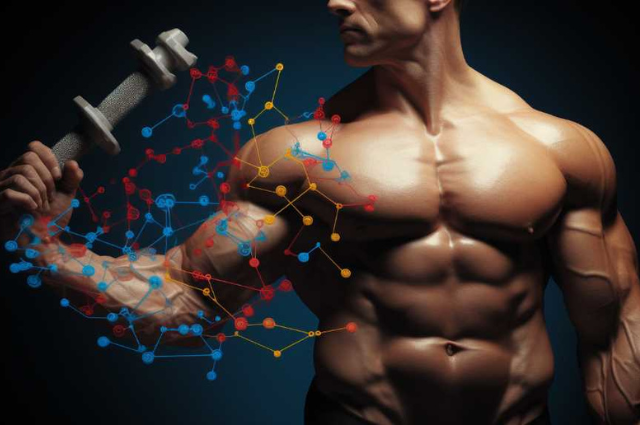Unmasking the Dark Side of Anabolic Steroids
Anabolic steroids, synthetic variations of the male sex hormone testosterone, are often used illicitly to enhance athletic performance and build muscle mass. While their appeal is undeniable, the potential consequences of anabolic steroid misuse are grave.
This paper delves into the darker side of anabolic steroids, exposing the short and long-term health risks, psychological impacts, ethical dilemmas in sports, and legal implications of steroid abuse. Furthermore, it offers insight into healthier, safer alternatives to these substances.
It is a comprehensive guide to understanding the allure and the peril of anabolic steroids, aiming to inform readers and mitigate the potential damage caused by their misuse.
Key Takeaways
- Anabolic steroids are synthetic variations of testosterone that mimic the muscle-building effects of testosterone.
- Misuse of anabolic steroids can lead to long-term consequences such as testicular atrophy and reduced sperm count.
- The use of anabolic steroids in sports raises ethical concerns about fair competition and can result in disqualification or bans.
- Healthy alternatives to anabolic steroids include a well-structured diet, consistent exercise regimens, legal supplements, and seeking guidance from healthcare professionals and certified trainers.
Understanding Anabolic Steroids
To delve into understanding anabolic steroids, we must first identify what these substances are and how they function within the human body. Anabolic steroids are synthetic variants of the male hormone testosterone, designed to mimic its muscle-building effects. The term 'anabolic' refers to the growth of skeletal muscle, while 'androgenic' references the increase in male sexual characteristics.
While naturally occurring hormones play a pivotal role in the body's growth and development, anabolic steroids are artificially introduced to enhance physical performance and augment muscle mass. These substances bind to androgen receptors, triggering a cascade of biochemical reactions that facilitate protein synthesis and muscle cell growth. Consequently, individuals who use anabolic steroids often exhibit increased strength and muscularity.
However, the body has a complex and delicately balanced hormonal system which can be significantly disrupted by the introduction of these synthetic compounds. The body's feedback mechanisms respond by reducing the natural production of testosterone, leading to potential long-term consequences such as testicular atrophy, reduced sperm count, and sexual dysfunction.
In addition, anabolic steroids can have a myriad of systemic side effects, including liver damage, cardiovascular diseases, mood swings, and psychiatric disorders. Their use is also associated with an increased risk of developing certain types of cancer. While the short-term enhancement of physical capabilities may be appealing to some, the potential health risks associated with anabolic steroid use underscore the need for caution and informed decision-making.
The Lure of Performance Enhancement
The pursuit of athletic excellence often entices individuals towards the use of anabolic steroids, despite the known health risks associated with these substances. This is primarily due to the inherent human desire for improvement, the competitive edge, and the societal pressure for perfection.
This drive for an enhanced performance can be traced back to the basic understanding of the physiological effects of anabolic steroids.
Scientifically speaking, anabolic steroids are synthetic derivatives of the hormone testosterone, known for its role in building muscle, burning fat, and enhancing athletic performance. When administered, these substances accelerate protein synthesis within cells, resulting in a buildup of cellular tissue, especially in muscles. This leads to increased muscle size and strength, reduced fat levels, and improved recovery times after workouts – factors that are highly sought after in high-intensity sports and bodybuilding.
The promise of such quick and significant improvements provides a seductive lure. However, these benefits come at a substantial and dangerous cost. The misuse of anabolic steroids can lead to severe health complications, including liver damage, cardiovascular diseases, psychological disorders, and hormonal imbalances, among others.
Moreover, it is noteworthy to mention the psychological aspect of this problem. The societal and peer pressure to achieve a certain physical standard can lead to a dependency on anabolic steroids, trapping users in a vicious cycle of continuous use and escalating health risks.
Short-Term Side Effects of Steroid Use
Under the veil of immediate athletic enhancement, the short-term side effects of anabolic steroid use reveal themselves insidiously, posing significant health risks even in their initial stages. These drugs, synthetically derived from testosterone, induce cellular and tissue changes that can disrupt various bodily systems, leading to an array of adverse effects.
Physiologically, one of the earliest manifestations is the disruption of hormonal balance. Anabolic steroids suppress the body's natural testosterone production, leading to symptoms of hypogonadism such as erectile dysfunction, testicular shrinkage, and infertility in males. In females, these substances can induce virilization, characterized by deepening of the voice, menstrual irregularities, and development of male-pattern baldness and body hair.
Moreover, the cardiovascular system is particularly vulnerable to the onslaught of steroids. A rapid increase in blood pressure, along with alterations in cholesterol levels, augment the risk of cardiovascular diseases. Steroids also stimulate the production of red blood cells, potentially leading to polycythemia, a condition that increases the risk of blood clotting and stroke.
Psychological effects are equally alarming. Steroid users may experience mood swings, increased aggression, anxiety, and depressive episodes, colloquially referred to as 'roid rage'. This is hypothesized to be due to the steroids' impact on various neurotransmitters in the brain.
Furthermore, anabolic steroids exert hepatotoxic effects. This results in liver damage, manifesting as jaundice, hepatic tumors, and peliosis hepatis, a potentially life-threatening condition characterized by blood-filled cysts in the liver.
Long-Term Health Risks
Experiencing the immediate, short-term side effects of anabolic steroids is just the tip of the iceberg, as these drugs harbor even more insidious, long-term health risks that can linger for years after discontinuation.
One of the most concerning long-term effects of continuous steroid use is cardiovascular complications. Medical studies have indicated a significant connection between prolonged steroid use and increased risk of myocardial infarction, stroke, and coronary artery disease. This is largely due to the drug's propensity to elevate cholesterol levels and blood pressure, thereby increasing the risk of atherosclerosis.
Steroid abuse can also lead to severe liver damage. Anabolic steroids are hepatoxic, which means they can cause cellular destruction in the liver, leading to conditions such as cirrhosis and liver failure. This organ is critical in the body's detoxification process, and any damage to it can have serious, even fatal, health implications.
There's also a psychological aspect to long-term steroid use. Chronic users often exhibit symptoms of aggression, irritability, and mood swings. In extreme cases, prolonged use can lead to psychiatric disorders like depression and anxiety.
Moreover, endocrine system disruptions are common with long-term steroid use. In men, this can result in testicular atrophy, impotence, and gynecomastia, while women may experience menstrual irregularities and hirsutism. Both genders are at risk of developing severe acne and premature balding.
Lastly, steroids can also compromise the immune system, making users more susceptible to infections and diseases. While the immediate effects of steroid use can be reversed, these long-term health risks can last a lifetime, making the drug's use a perilous gamble.
The Psychological Impact of Steroids
In addition to physical health risks, anabolic steroid use is also linked to a spectrum of adverse psychological effects, ranging from mood disorders to cognitive impairments. Research has revealed connections between anabolic steroid use and the onset of mood disorders such as depression, mania, and anxiety. The severity of these conditions can vary, but in some cases, they can persist after steroid use has ceased, indicating a potentially long-term impact on the user's mental health.
Anabolic steroid use has also been associated with cognitive impairments. Studies have reported deficits in attention, memory, and executive function among steroid users. These cognitive impairments can affect an individual's ability to perform daily tasks, work efficiently, and maintain interpersonal relationships. Furthermore, the potential neurotoxic effects of steroids may lead to structural and functional changes in the brain, contributing to these cognitive deficits.
Moreover, certain psychological effects may be linked to the withdrawal from anabolic steroids. These include mood swings, restlessness, fatigue, insomnia, loss of appetite, and decreased libido. The severity and duration of these effects may depend on the duration of steroid use, the dosage, and individual characteristics.
The psychological effects of anabolic steroids are a significant concern and further highlight the dangers associated with their use. It is crucial for healthcare professionals to be aware of these risks and to provide appropriate support and interventions for individuals using or considering the use of anabolic steroids. Understanding the full range of potential adverse effects can inform prevention strategies, improve treatment outcomes, and contribute to broader public health initiatives.
Steroids and Sporting Ethics
Beyond the detrimental health and psychological effects, anabolic steroid use also raises critical questions about sporting ethics. The use of performance-enhancing drugs (PEDs), including anabolic steroids, undermines the foundation of fair play and respect, integral to the ethos of sports.
Performance enhancement, achieved through artificial means, distorts the level playing field in sports. It creates an environment where winning at all costs becomes the norm, devaluing the principles of hard work, perseverance, and natural talent. Moreover, athletes who refuse to use steroids are effectively penalized, compelled to compete against steroid-enhanced opponents.
Additionally, the clandestine nature of steroid use breeds dishonesty and deceit. Athletes often resort to sophisticated doping strategies to avoid detection, further eroding the integrity of sports. This deception not only affects their relationship with competitors, officials, and fans, but also encourages a culture of secrecy and manipulation, detrimental to the sporting community.
Scientifically, anabolic steroids offer a significant competitive advantage, augmenting strength, endurance, and recovery rate. However, this advantage is ethically illegitimate. It goes against the spirit of sports, which is meant to celebrate human achievement, determination, and skill, not the capacity to access and effectively use banned substances.
Legal Implications of Steroid Abuse
Several jurisdictions worldwide have implemented stringent laws to deter the misuse and trafficking of anabolic steroids, recognizing the substantial legal implications of steroid abuse. These laws are predicated on comprehensive scientific research that highlights the detrimental effects of steroids on human health and their potential for abuse.
In the United States, for example, anabolic steroids are classified as Schedule III controlled substances under the Controlled Substances Act. This classification implies that possession, distribution, or manufacture of these substances without a valid medical prescription is punishable by law, with penalties including imprisonment and hefty fines.
Similarly, in the United Kingdom, anabolic steroids are classified as Class C drugs under the Misuse of Drugs Act. This legislation makes the unauthorized possession, supply, or production of these substances a criminal offense. Notably, even the import or export of anabolic steroids is illegal unless conducted under the terms of a license issued by the Secretary of State.
In Australia, anabolic steroids are categorized under Schedule 4 (Prescription Only Medicine) or Schedule 8 (Controlled Drug) of the Poisons Standard, depending on the specific steroid. Importation or exportation of these substances without a permit can result in severe penalties.
The legal implications of steroid abuse extend beyond individual users. Medical practitioners who prescribe these substances without a valid medical reason may face professional sanctions. Similarly, sports organizations risk reputational damage and potential legal action for failing to adequately address steroid use among athletes.
The widespread legal ramifications of steroid abuse underscore the seriousness with which this issue is viewed globally, highlighting the urgent need for continued efforts to combat this pervasive problem.
Healthy Alternatives to Anabolic Steroids
Amid the complex web of legal and health issues surrounding anabolic steroids, there exist healthy alternatives that can assist in muscle development and athletic performance without the associated risks. These alternatives predominantly involve natural methods, such as a well-structured diet, consistent exercise regimens, and the use of legal supplements.
A balanced diet, rich in lean proteins, complex carbohydrates, and healthy fats, is crucial for muscle growth and repair. Protein sources, such as lean meats, fish, eggs, and plant-based proteins, provide the essential amino acids required for muscle protein synthesis. Complex carbohydrates fuel workouts and replenish glycogen stores in muscles, while healthy fats play a significant role in hormone production, including testosterone, which is essential for muscle growth.
Consistent resistance and strength training exercises stimulate muscle growth by causing damage to the muscle fibers, triggering a repair process that leads to an increase in muscle size and strength. High-intensity interval training (HIIT) can also enhance athletic performance, by improving cardiovascular health and metabolic efficiency.
Legal supplements, such as creatine, beta-alanine, and branched-chain amino acids (BCAAs), have been scientifically proven to support muscle growth and performance. Creatine, a naturally occurring molecule in the body, enhances strength and power output. Beta-alanine can improve exercise capacity and lessen muscle fatigue. BCAAs, especially leucine, stimulate muscle protein synthesis and may aid in muscle recovery.
While these alternatives may not yield results as rapidly as anabolic steroids, they offer sustainable gains without detrimental health effects. Moreover, they promote overall health, a crucial aspect often overlooked in the quest for enhanced physical performance.
Frequently Asked Questions
What Is the Global Prevalence of Anabolic Steroid Abuse Among Athletes and Non-Athletes?
The global prevalence of anabolic steroid abuse among athletes and non-athletes varies by region and demographic.
A 2014 review in the Journal of International Society of Sports Nutrition estimated that up to 1% of the total global population had used anabolic steroids. This usage is significantly higher among athletes, with some studies indicating usage rates of up to 13.4% in this population.
Non-athlete usage also varies, but is generally lower than among athletes.
Are There Any Specific Demographic Groups That Are More Prone to Anabolic Steroid Abuse?
Research indicates that anabolic steroid abuse is more prevalent among specific demographic groups. These include professional athletes, particularly those involved in strength and endurance sports, and young men in the general population who desire to improve their physical appearance.
Additionally, certain professions such as bodyguards and law enforcement officers may have higher incidences of steroid abuse due to the physical demands of their jobs.
How Can One Identify if a Person Is Abusing Anabolic Steroids Discreetly?
Identifying discreet anabolic steroid abuse can be challenging. However, certain physical and behavioral changes might suggest misuse.
Physically, rapid muscle gain, acne, and in males, breast development may occur. Behaviorally, increased aggressiveness or mood swings can be indicative. Women might experience deepening of the voice or increased body hair.
These signs are not conclusive, but in combination, they may suggest steroid abuse. A medical professional's consultation is essential for accurate identification.
What Are the Societal and Economic Costs Associated With Anabolic Steroid Abuse?
The societal and economic costs associated with anabolic steroid abuse are multifaceted. It ranges from healthcare expenses stemming from related health complications, to productivity losses in the workforce due to illness or premature death.
The societal costs include increased crime rates and deterioration of social relations, as steroid abuse can lead to aggressive behavior. Also, resources are required for law enforcement, public education, and prevention programs.
How Can Educational Institutions Play a Role in Preventing Anabolic Steroid Abuse Among Students?
Educational institutions can significantly contribute to preventing anabolic steroid abuse among students by incorporating comprehensive drug education programs into their curriculum. These programs should focus on the harmful effects of steroid abuse, both physically and psychologically.
Additionally, schools can foster a culture promoting natural and healthy ways to improve athletic performance and body image. Regular seminars, workshops, and counseling sessions can also be effective deterrents against steroid abuse.
Conclusion
The utilization of anabolic steroids manifests a perilous trend, fraught with detrimental health consequences and ethical dilemmas. The lure of enhanced performance often obscures the significant physical, psychological, and legal risks.
The promotion and adoption of healthier, natural alternatives to anabolic steroids is crucial. Comprehensive education about the potential dangers of steroids may serve as a deterrent, fostering an environment that prioritizes personal health and ethical sportsmanship over short-lived gains.







